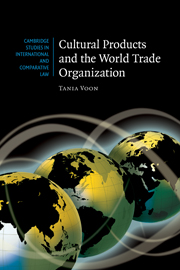Book contents
- Frontmatter
- Contents
- Detailed chapter outline
- Table of GATT/WTO agreements
- Table of GATT/WTO cases
- Table of abbreviations
- Foreword
- Acknowledgements
- Part I Stalemate and its ideological origins
- 1 Trade and culture
- 2 A case study of cultural products: protectionism vs cultural policy
- 3 What's wrong with the current treatment of cultural products?
- Part II Options for the future
- Bibliography
- Index
1 - Trade and culture
Published online by Cambridge University Press: 23 February 2010
- Frontmatter
- Contents
- Detailed chapter outline
- Table of GATT/WTO agreements
- Table of GATT/WTO cases
- Table of abbreviations
- Foreword
- Acknowledgements
- Part I Stalemate and its ideological origins
- 1 Trade and culture
- 2 A case study of cultural products: protectionism vs cultural policy
- 3 What's wrong with the current treatment of cultural products?
- Part II Options for the future
- Bibliography
- Index
Summary
‘Trade and …’ problems
At the heart of a great many trade disputes lies a ‘trade and …’ problem; that is, a clash between the goal of trade liberalisation and some other goal. As Joel Trachtman has explained, these problems involve ‘conflicts between trade values and other social values’, such as ‘environmental protection, labour rights or free competition’. Indicative of such conflicts are clashes within the WTO (and its predecessor, GATT 1947) over EC import bans on asbestos and meat treated with certain growth hormones, US prohibitions on imports of shrimp harvested in a manner threatening sea turtles and on the cross-border supply of gambling and betting services, and import restrictions and tax requirements imposed on cigarettes by Thailand and the Dominican Republic.
I do not propose to debate the virtues of trade liberalisation as a general matter. However, in a nutshell, the theory is that the removal of trade barriers (such as tariffs and import quotas), which distort international trade, will allow each country to specialise in producing goods or providing services in industries in which it has the greatest ‘comparative advantage’, and to import goods and services in industries in which it lacks this advantage. Although initially this may cause someadjustment problems (because, for instance, a steelworker cannot transform overnight into a computer programmer), in the longer term, national and global welfare will increase.9 Of course, the underlying theory of comparative advantage has its limits. In some areas, such as national security, countries may want to retain all or some of their industrial and technical capabilities, regardless of their comparative advantage.
- Type
- Chapter
- Information
- Cultural Products and the World Trade Organization , pp. 3 - 36Publisher: Cambridge University PressPrint publication year: 2007
- 1
- Cited by



